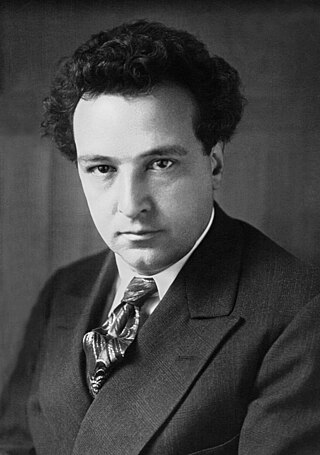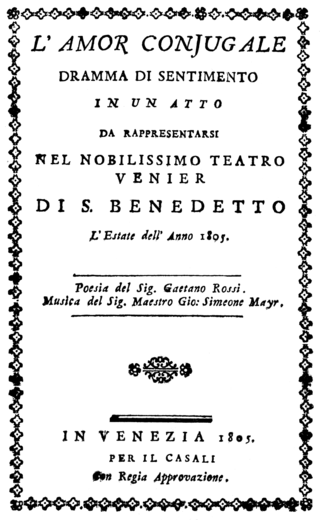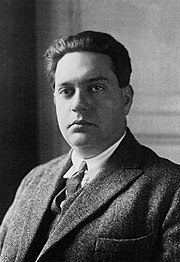
Jeanne d'Arc au bûcher is a mystère lyrique, or sung mystery play, by Paul Claudel with music by Arthur Honegger. Commissioned by Ida Rubinstein, it was written in 1935, premiered in 1938 and published in 1947 after rounds of minor revisions that extended into 1944. Claudel narrates Joan of Arc's last minutes of life with flashbacks to her trial and younger days. His poème of eleven scenes and a prologue is the work's backbone, with key scenes spoken, but the music, particularly the choral writing, is generally considered its strength, despite Honegger's avowal that he had merely put his services “at the disposal of” the poet. Claudel's frame gave Honegger a space between Heaven and Earth, past and present, for mixing styles and using musical tools — monody, harmony and counterpoint — to build sculpted blocks of sound. One detail of his score is its part for ondes martenot, an early electronic instrument played at the premiere by its inventor Maurice Martenot. The mystère lyrique lasts about 75 minutes.

Bellérophon is an opera with music by Jean-Baptiste Lully and a libretto by Thomas Corneille and Bernard le Bovier de Fontenelle first performed by the Opéra at the Théâtre du Palais-Royal in Paris on 31 January 1679.

Proserpine (Proserpina) is an opera with music by Jean-Baptiste Lully and a libretto by Philippe Quinault first performed at Saint-Germain-en-Laye on 3 February 1680.

Tarare is an opéra composed by Antonio Salieri to a French libretto by Pierre Beaumarchais. It was first performed by the Paris Opera at the Théâtre de la Porte Saint-Martin on 8 June 1787. Salieri also reworked the material into an Italian version retitled Axur, re d'Ormus with libretto by Lorenzo Da Ponte, which opened in Vienna in January 1788.

Pierre le Grand is an opéra comique by André Grétry. The libretto, by Jean-Nicolas Bouilly, is based on the early life of the Russian tsar Peter the Great. It was first performed in Paris on January 13, 1790, with Louise-Rosalie Lefebvre, known as Madame Dugazon, as Catherine.

Dardanus is an opera by Antonio Sacchini. It takes the form of a tragédie lyrique in four acts. It was first performed at Versailles on 18 September 1784, and subsequently at the Paris Opera on 30 November of the same year. The French-language libretto was adapted by Nicolas-François Guillard from that by Charles-Antoine Leclerc de La Bruère, which had already been set to music by Jean-Philippe Rameau in his earlier opera of the same name.

La mère coupable is an opera in three acts, Op. 412, by Darius Milhaud to a libretto by Madeleine Milhaud after the 1792 play, the third in Beaumarchais’ Figaro trilogy. It premiered at the Grand Théâtre de Genève on 13 June 1966.

Olimpie is an opera in three acts by Gaspare Spontini. The French libretto, by Armand-Michel Dieulafoy and Charles Brifaut, is based on the play of the same name by Voltaire (1761). Olimpie was first performed on 22 December 1819 by the Paris Opéra at the Salle Montansier. When sung in Italian or German, it is usually given the title Olimpia.

Uthal is an opéra comique in one act by the French composer Étienne Méhul. The libretto, by Jacques-Benjamin-Maximilien Bins de Saint-Victor is based on the Ossian poems of James Macpherson. It was first performed at the Opéra-Comique in Paris on 17 May 1806. Méhul tried to give the work a dark "Scottish" atmosphere by eliminating the violins from the orchestra and replacing them with violas.

Cover of French Opera Padmâvatî. c.1923
Mârouf, savetier du Caire is an opéra comique by the French composer Henri Rabaud. The libretto, by Lucien Nepoty, is based on a tale from the Arabian Nights. Mârouf was first performed at the Opéra-Comique, Paris, on 15 May 1914. The premiere was a great success and Mârouf became Rabaud's most popular opera. The score makes great use of oriental colour. The Western Hemisphere premiere of Mârouf was given at the Teatro Colón in Buenos Aires on July 24, 1917, with Armand Crabbé as Mârouf, Ninon Vallin as Saamcheddine, and Marcel Journet as the Sultan, conducted by Gino Marinuzzi. The United States premiere of the opera was given at the Metropolitan Opera on December 19, 1917, with Giuseppe De Luca in the title role, Frances Alda as Princess Saamcheddine, and Pierre Monteux conducting. The Viennese premiere was at the Vienna State Opera on 24 January 1929, with Josef Kalenberg and Margit Angerer, and Franz Schalk conducting.

Medea in Corinto is an 1813 opera in Italian by the composer Simon Mayr. It takes the form of a melodramma tragico in two acts. The libretto, by Felice Romani, is based on the Greek myth of Medea and the plays on the theme by Euripides and Pierre Corneille. The same subject had formed the basis for Luigi Cherubini's famous opera Médée (1797) which may have had an influence on Mayr's work. Medea in Corinto was first performed at the Teatro San Carlo in Naples on 28 November 1813 and was Mayr's greatest theatrical success.

Antigone is an opera in three acts by Arthur Honegger to a French libretto by Jean Cocteau based on the tragedy Antigone by Sophocles. Honegger composed the opera between 1924 and 1927. It premiered on 28 December 1927 at the Théâtre Royal de la Monnaie with sets designed by Pablo Picasso and costumes by Coco Chanel.

L'Aiglon is an opera in five acts composed by Arthur Honegger and Jacques Ibert. Honegger composed acts 2, 3, and 4, with Ibert composing acts 1 and 5. A 2016 reviewer described it as "a singular piece of work" with its "blend of operetta, divertissement, conversation piece, historical pageant and, in the disturbingly powerful fourth act set on the Napoleonic battlefield at Wagram, phantasmagoria peopled with living figures onstage and dead voices off".

Le maître de chapelle, ou Le souper imprévu is an opéra comique in two acts by the Italian composer Ferdinando Paer. The French libretto, by Sophie Gay, is based on Le souper imprévu, ou Le chanoine de Milan by Alexandre Duval (1796).

L'amor coniugale is an opera in one act by Simon Mayr set to an Italian libretto by Gaetano Rossi. It premiered at Padua's Teatro Nuovo on 26 July 1805.

Renaud is an opera by Antonio Sacchini, first performed on 28 February 1783 by the Académie Royale de Musique at the Théâtre de la Porte Saint-Martin in Paris. It takes the form of a tragédie lyrique in three acts. The French libretto, by Jean-Joseph Lebœuf, is based on Cantos XVII and XX of Torquato Tasso's epic poem Gerusalemme liberata and, more directly, on the five-act tragedy by Simon-Joseph Pellegrin, Renaud, ou La suite d'Armide, which had been set to music by Henri Desmarets in 1722 and was intended as a sequel to Lully's famous opera Armide. According to Théodore Lajarte, Lebœuf was helped by Nicolas-Étienne Framery, the regular translator of Sacchini's libretti.

Les cadeaux de Noël is an opera in one act composed by Xavier Leroux to a French-language libretto by Émile Fabre. Described as a conte héroïque, it was premiered by the Opéra-Comique at the Salle Favart Theatre in Paris on Christmas Day 1915. Its story of four children, whose parents had been killed by German soldiers but who nevertheless found hope in a seemingly bleak Christmas, had a particular resonance with French audiences in the midst of World War I. The opera was a great success in Paris, and subsequently performed in Italy, Monte Carlo and Latin America.
Christopher Columbus was an Italian explorer and navigator who completed four voyages across the Atlantic Ocean, opening the way for European exploration and colonization of the Americas. His expeditions, sponsored by the Catholic Monarchs of Spain, were the first European contact with the Caribbean, Central America, and South America. He has been represented in many fictional and semi-fictional works, including plays, operas, films and TV, as well as literary works.
Le Livre de Christophe Colomb is a theatre play in two parts by the French author Paul Claudel. The play was commissioned by the German theatre director Max Reinhardt, and originally conceived as an opera.

















